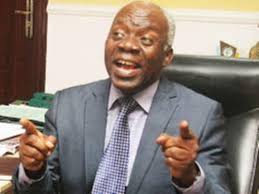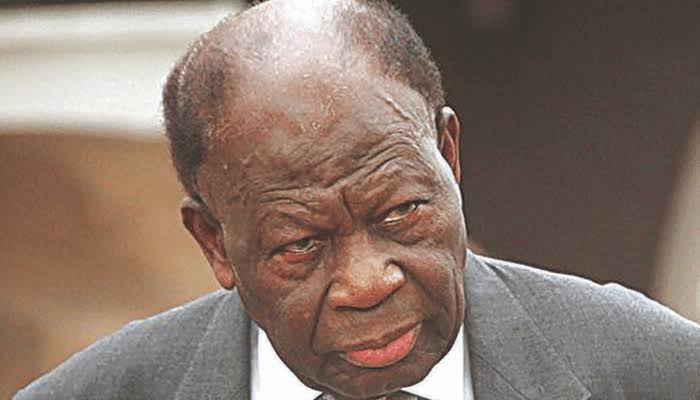Declaration of Assets: A major tool for fighting corruption in Nigeria

By Femi Falana, SAN
I am indebted to the Human and Environmental Development Agenda (HEDA Resource Centre), Kano State Public Complaint and Anti-Corruption Commission (PCAC) and the Code of Conduct Bureau (CCB) for jointly organizing this programme and for inviting me to address this assembly of state and non-state actors in the fight against corruption in Nigeria. Even though the Bola Tinubu administration has not formulated an anti-corruption agenda, the Constitution has imposed a duty on the Nigerian State to abolish corruption and abuse of power.
In my presentation, I am going to show that the Code of Conduct Bureau and Code of Conduct Tribunal have been deliberately rendered ineffective so that the acquisition of illegal wealth by members of the political class will not be exposed. In conclusion, I will enjoin the anti-graft agencies to involve the people in fighting corruption because they are the hapless victims of the dangerous menace.
PURPOSE OF ASSET DECLARATION
According to the Jowitt’s Dictionary of English Law, declaration means “a proclamation or affirmation, open expression or publication, a formal statement intended to create, preserve, assert or testify to a right.” Collins Dictionary has also defined declaration as “an official announcement or statement.” Since declaration means official announcement it is submitted that asset declaration means the official announcement of the assets and liabilities of public officers. The purpose of asset declaration is the promotion of public accountability and prevent illicit acquisition of wealth by public officers.
In Nigeria, asset declaration is the disclosure or official announcement of all assets owned by public officers including elected officials and members of the legislature and judiciary. To that extent, it is illegal and unconstitutional on the part of the CCB to continue to treat the asset declaration forms of public officers as private documents whose contents are only known to the declarants and top officials of the CCB.
According to the Constitution, every Public Officer is required to declare his/her assets/liabilities upon assumption of office and at the end of his term of Office or at interval of four years for public officers on continuous employment of Government whether Federal, State or Local Government or at such other intervals as the Bureau may determine from time to time. After the completion of the asset declaration form, the declarant must personally go and swear to the declaration before a High Court Judge before submitting it to the Bureau which shall keep same in its custody.
It is pertinent to note that only assets and liabilities owned by public officers at the time of assuming office are required to be declared. The assets and liabilities declared by public officers include those owned by their spouses if they are married) and children under 18 years. All declarations made by a declarant are subject to verification by the officers of the Bureau authorized on that behalf. Owing to lack of resources the Bureau has not been able to discharge the responsibility of verifying assets of public officers located in foreign countries.
EFFECT OF FAILURE TO DECLARE ASSETS
It is submitted that failure to declare assets as required under the provisions of paragraph 11 of the 5th Schedule to the Constitution and false declaration of assets shall attract prosecution and on conviction the public officer involved shall be sentenced to any or all of the following: removal from office, vacation of official seat in any legislative house, as the case may be, imposition of fine, disqualification from membership of a legislative house and from holding any public office for a period not exceeding ten years and seizure and forfeiture to the state of any property (ies) acquired in abuse of office.
The Constitution states that the sanctions mentioned above are not exhaustive as they shall be without prejudice to the penalties that may be imposed by any law where the conduct is also a criminal offence. Though the law gives a right of appeal from the Code of Conduct Tribunal to the Court of Appeal, the prerogative of mercy exercised by the President shall not apply to any punishment imposed by the Code of Conduct Tribunal. Furthermore, the Constitution gives the National Assembly the power to prescribe more punishments and to give the Bureau more power as it deems fit.
Even though the CCB was established by the 1979 Constitution and 1999 Constitution it has not had any positive impact on public accountability in Nigeria as asset declaration forms of public officers are kept secret. Owing to such secrecy the members of the public have been denied access to the asset declaration forms submitted to the Code of Conduct Bureau. Therefore, concerned citizens and civil society organizations have not been opportune to promote public accountability by exposing ill acquired wealth of public officers.
Thus, the government has failed to involve the people in the fight against corruption. By encouraging the CCB to treat asset declaration forms of public officers as private documents the government has frustrated the media from promoting public accountability and transparency as enjoined by section 22 of the Constitution. However, it is submitted that asset declaration forms and affidavits deposed to by public officers before High Court Judges and submitted to the Code of Conduct Bureau cannot be said to be private documents. Therefore, the rejection of the request by groups and individuals for asset declaration forms of public officers on the ground that they are private documents violates Section 52 of the Evidence Act.
PUBLIC OFFICERS WHO HAD DECLARED ASSETS
In spite of his anti-corruption crusade, President Olusegun Obasanjo did not disclose his assets to the Nigerian people. In 2007, former president Umaru Yar’Adua became the first Nigerian president to declare his assets and caused them to be published by the media. However, his successor, President Goodluck Jonathan refused to declare and publish his assets on the ground that it went against his principles. President Buhari and Vice President Yemi Osinbajo SAN disclosed their assets publicly in 2015 but failed to do so in 2019 and at the end of their tenure in 2023. President Bola Tinubu and Vice President Kasim Shetima have failed to cause their asset declaration forms to be published by the media.
Dr. Kayode Fayemi remains the only state governor in the country who has declared his assets and make them public. That was in October 2010 when he assumed office as Governor of Ekiti State. To the delight of the Nigerian people, Dr. Fayemi and his Deputy, Mrs. Olufunmilayo Olayinka announced their assets. But Dr. Fayemi did not disclose his assets at the end of his tenure. He also failed to publish the assets declared by him as a Minister and as a second term Governor of Ekiti State. The only other public officer who decided not to make his personal assets secret is Dr. Chidi Odinkalu. He declared his assets and disclosed them in January 2012 upon his appointment as the Chairman of the National Human Rights Commission.
Having failed to justify the secrecy surrounding the declaration of assets of public officers, the Code of Conduct Bureau has modified its position. It has announced that the assets submitted by public officers cannot be disclosed without their consent or authorization. In other words, public disclosure of assets is at the discretion of public officers. With respect, the decision of the CCB to withhold information on asset declaration of public officers has made it impossible for citizens to exercise their constitutional duty of reporting non-compliance with the provisions of the Code of Conduct for Public Officers.
ASSET DECLARATION UNDER FREEDOM OF INFORMATION ACT
In order to allow citizens to access public records and thereby promote public accountability and transparency in government, the Freedom of Information Act was enacted in 2011 by the Jonathan administration. Accordingly, it is the duty of all public institutions to furnish citizens with official documents requested by them. Sometime in 2019, the Socio Economic Rights and Accountability Project (SERAP) requested for certified true copies of asset declaration forms submitted to the Code of Conduct Bureau (CCB) by President Muhammadu Buhari and Vice President Yemi Osinbajo. The request was rejected by the CCB on the ground that it is not covered by the provisions of the Freedom of Information Act. Completely dissatisfied with the decision of the CCB the SERAP approached the Federal High Court for redress.
In dismissing the application the learned trial judge, Musiliu Hassan J. (as he then was) held that by virtue of paragraph 3(a, b & c) of part 1st and 3rd Schedule of the Constitution it is the duty of the National assembly to prescribe the conditions for the release of Asset declaration forms for inspection and to achieve this, the National assembly has to pass an Act to that effect which has not be done. The court also held that the terms and conditions to be prescribed by National assembly must be specific and related to Asset declaration of Public officers and not a legislation of general nature such as the Freedom of information Act, 2011.
In Registered Trustee Of Unemployed Youths Initiative vs. Code Of Conduct Bureau (2023) LPELR-60083(CA), the plaintiff brought an action against the Defendant and claimed that it had standing on behalf of the country’s disadvantaged youths to obtain a judicial declaration to the effect that the Bureau was required under the Freedom of Information Act of 2011 and other relevant laws to make the written declarations of public officials publicly available. The case was dismissed for lack of locus standi on the part of the Appellant.
While the Court of Appeal held that the Appellant had sufficiently established locus standi to institute the action it held that by the provision of Sections 2 and 3 of the Freedom of Information Act, 2011, the Code of Conduct Bureau is the only body with the functions and powers to verify the declaration of assets of a public officer. The public has no such powers except as approved or authorized by the Code of Conduct Bureau for such purpose as required by the provision of Paragraph 11 of The Fifth Schedule to the 1999 Constitution. As such, the Appellant cannot have access to the Assets Declaration Forms of public officers for the purpose of verification. The Court cited the case of Code of Conduct Bureau & Ors vs. Nwankwo (2018) LPELR 44762 (CA) in support.
The Court also stated that in the absence of any authorization by the Code of Conduct Bureau, the general public cannot verify declaration of assets by public officers. Therefore, the claim of the Appellant at the trial Court cannot stand. The Court proceeded to dismiss the case of the Appellant at the trial Court for lacking in merit.
It is submitted that the cases of Registered Trustee Of Unemployed Youths Initiative vs. Code of Conduct Bureau (Supra) was wrongly decided by the Court of Appeal as the Justices failed to take cognizance of sections 39 of the Nigerian Constitution and article 9 of the African Charter on Human and Peoples Rights (Ratification and Enforcement) Act which guarantee the fundamental right of Nigerian people to access information. See Dododo v Economic and Financial Crimes Commission & Ors (2013) 1 NWLR (PT 1336) 468.
THE POWER OF CODE OF CONDUCT TRIBUNAL
Exasperated with the slow pace of trial of corruption cases in the regular courts, the anti-graft agencies have called for the establishment of an anti-corruption court. I have always opposed the call because of the fact that the anti-graft agencies have failed to take advantage of the provisions of the Code of Conduct Bureau and Tribunal Act. In other words, the Economic and Financial Crimes Commission and the Independent Corrupt Practices and Other Offences Commission ought to collaborate with Code of Conduct Bureau in the investigation and prosecution of public officers involved in the illicit acquisition of wealth in contravention of the code of conduct for public officers.
In Ogbuagu v Ogbuagu (1981) 2 NCLR 680 it was held that by paragraph 18 of the 5th schedule of the 1999 Constitution the Code of Conduct Tribunal has the power to sanction a public officer by disqualifying him from holding public office for a period not exceeding 10 years. In the case of Ahmed v Ahmed (2013) 15 NWLR (PT 1377) 274 the Supreme Court held that it is the tribunal that has the power over a breach of the code of conduct for public officers. In Dr Bukola Saraki v. Federal Republic of Nigeria (2018) 16 NWLR (pt. 1646) 433-434, the Supreme Court ruled that the Economic and Financial Crimes Commission lacks the vires to investigate and prosecute the appellant for the breach of the provisions of the Code of Conduct Bureau and Tribunal Act. It was for that principal reason that Senator Saraki was freed by the Supreme Court.
With respect, the apex court erred in law as the agencies of the State are empowered to collaborate in investigation and prosecution of crimes. In Bamaiyi v Attorney-General of the Federation (2001) 12 NWLR (PT 727) 468 the same court had held that by virtue of section 174 of the Constitution, the Federal Attorney- General has the power to constitute the Special Investigation Panel that investigated the applicant and that the report which form the basis of the charge against him before the Magistrates Court was legal.
It is undoubtedly clear that the Code of Conduct Bureau and Code of Conduct Tribunal are two vital institutions in the fight against corruption. This was demonstrated in the case of Federal Republic of Nigeria v Justice Walter Onnoghen. The defendant who was the Chief Justice of Nigeria at the material time was suspended from office on the basis of the ex parte order issued by the Code of Conduct Tribunal. He was subsequently tried, convicted and sentenced to removal from office by the Code of Conduct Tribunal.
Even though it was found that the ex parte was procured illegally the Court of Appeal rejected the plea of the Chief Justice to quash his conviction and removal from office on the ground that the issues raised in the appeal had become academic. However, the case confirms that the Code of Conduct Tribunal can play a leading role in the enforcement of the code of conduct for public officers enshrined in the Constitution.
But, in a series of letters obtained by ‘Peoples Gazette’, the Code of Conduct Bureau, while acknowledging that the FOI Act guarantees the right of a person to information, argued that the request for asset declaration of public office holders constitute an invasion of privacy which is against the provision of the Act. The magazine has rightly noted that the Bureau’s current stand “negates its 2019 move that led to the removal of former Chief Justice of Nigeria Walter Onnoghen who was sacked over false asset declaration. The CCB in 2019 did not consider the privacy of the former CJN before expeditiously providing his asset declaration data to Anti-Corruption and Research Base Data Initiatives, the body which filed the petition that led to Mr Onnoghen’s removal.”
RESORT TO PUBLIC INTEREST LITIGATION TO PROMOTE PUBLIC ACCOUNTABILITY BY HEDA.
In addition to the defence of human rights, HEDA has resorted to the effective use of public interest litigation to promote public accountability and transparency in government in the country. The cases which have been won by HEDA have been said to represents “a significant milestone in enforcing transparency and accountability within public institutions, underscoring the imperative of complying with the Freedom of Information Act to foster good governance and combat corruption.” Three of the cases include:
- In Incorporated Trustees of HEDA Resource Centre v Attorney-General of the Federation (Suit No FHC/L/CS/40 /2021), the AGF on November 9, 2020, inaugurated the Inter-Ministerial Committee on the disposal of assets forfeited to the Federal Government pursuant to the Asset Tracing, Recovery and Management Regulations, 2019 which he had promulgated. But HEDA, through its counsel, Omotayo Olatubosun, challenged the AGF’s power to set up the committee.
In granting the reliefs sought by HEDA, Justice Lewis-Allagoa held: “I am entirely in agreement with the submission of counsel to the plaintiff that the Asset Tracing, Recovery and Management Regulations, 2019 are contrary to the statutory provisions of the Economic and Financial Crimes Commission EFCC Act, Trafficking in Persons Cohabitation Enforcement and Administration Act, NDLEA Act and Immigration Act.
A careful perusal of the above statutory provisions will show the provisions for the Attorney-General of the Federation to make regulations for the agencies for disposal of assets under the various enactments listed above.”
Consequently, the Court nullified the Asset Tracing, Recovery and Management Regulations, 2019 for being an invalid statutory instrument. The court further nullified all sales and disposals of assets made by the Attorney-General of the Federation (AGF) Abubakar Malami, SAN under the Asset Tracing, Recovery and Management Regulations, 2019.
- In HEDA v Nigeria Customs Service Board (Suit No FHC/ABJ/CS/52/2022) the plaintiff sued over the defendant’s failure to provide the information requested from it on the details of a contract. HEDA in a Motion on Notice dated March 25, 2022, but filed on March 28, 2022, asked the Court for an order of Mandamus compelling the board to supply the information it requested on December 17, 2021, including the name of the company/firm it contracted to conduct the 2021 recruitment screening exercise and the amount awarded.
In his judgment, Justice Nwite ordered, “That an order of Mandamus is hereby made compelling the Respondent to supply the information requested by the Applicant as contained in the Applicant’s Request dated 17/12/2021 marked as Exhibit HEDA 1, to wit: ‘The name of the Company/Firm contracted by the Nigerian Customs Service Board/Nigeria Customs Service to conduct the just concluded Nigeria Custom Service Recruitment Screening Exercise 2021, and the amount awarded The process/guidelines for selection adopted by the contracted Company/Firm and the Nigeria Customs Service in the said recruitment exercise.”
- In HEDA v Central Bank of Nigeria (Suit No FHC/ABJ/CS/1622/2020), the plaintiff had initially submitted a comprehensive request to the CBN on November 14, 2020, seeking detailed information about the CBN’s schemes designed to sell the dollar at subsidized rates. The request included specific details such as the disbursed amounts under each scheme, sector-wise breakdowns, and beneficiary information related to the forex intervention scheme.
Unfortunately, the CBN did not respond to the FoI request, prompting HEDA Resource Centre to pursue legal action to challenge the CBN’s denial. In response, the CBN filed a Notice of Preliminary Objection on November 3, 2021, but the court ultimately dismissed it. The CBN later submitted a counter-affidavit on February 2, 2022, denying possession of the requested information. In its judgment, the court emphasized the vital role of public access to information and records in ensuring accountability, transparency, citizen participation, and good governance within a democracy. Consequently, the court issued a compelling order to the CBN to disclose the information requested by HEDA in their FoI request. The court deemed the CBN’s failure to provide the information as unlawful, resulting in an order of Mandamus to release the requested information outlined in HEDA’s FoI request dated October 14, 2020.
THE TASKS AHEAD
The control of the CCB and CCT by the Federal Ministry of Justice cannot be justified under the current political dispensation. Both CCB and CCT should henceforth assert their autonomy in line with the provisions of the Constitution. Furthermore, a campaign should be embarked upon by civil society organizations for adequate funding for the CCB and CCT to strengthen their capacity to discharge their onerous duties in promoting public accountability. Since the CCB lacks the capacity to verify the assets of all public officers in and outside the country, it is suggested that the verification of assets by the CCB be carried out online.
In order to discharge its constitutional functions the CCB should engage the services of competent valuers, investigators and prosecutors. With only three judges, the CCT cannot handle all cases of failure to declare assets and false declaration of assets in all the 36 states of the Federation and the Federal Capital Territory. The Constitution should be amended to increase the number of CCT Judges to 100. It is also suggested that the CCT should have regional offices while state governments should establish code of conduct agencies to monitor the assets of public officers and civil servants in the service of state and local governments.
CONCLUSION
No doubt, the challenges facing the CCB and CCT are enormous. But they are not insurmountable. The anti-graft agencies should form an alliance with progressive political organisations, trade unions, women and youth organizations with a view to fighting together for a society where the welfare and security of the majority of the people will be the primary purpose of government. To achieve the objective, popular forces should be prepared to challenge the neo-liberal ideologues who are promoting poverty through the domination of the economy by market forces.
Finally, permit me to call on the CCB to partner with the anti-graft agencies and financial institutions in Western countries and the United Arab Emirates with a view to confiscating properties acquired by public officers which are not declared in Nigeria. CCB should also collaborate with Nigerian citizens in the diaspora who are prepared to provide information on funds and properties that have been illegally acquired by public officers and hidden abroad.
Being the Keynote Address delivered by Femi Falana SAN at the 32nd Anti-Corruption Situation Room (ACSR) on “Fight Against Corruption in Nigeria: Declaration of Asset for Public Holder” held by the Human and Environmental Development Agenda (HEDA Resource Centre) in Kano, Kano State on September 26, 2023)




